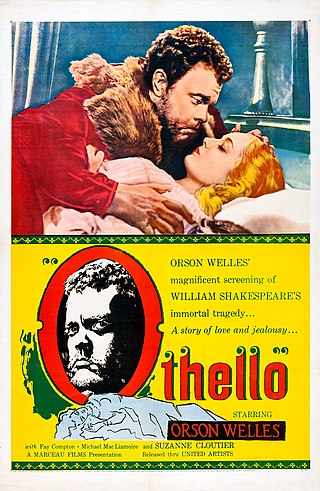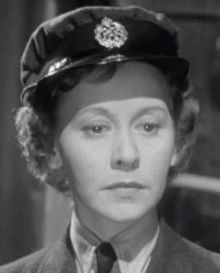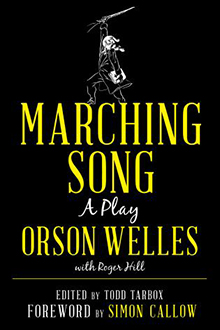Related Research Articles

George Orson Welles was an American director, actor, writer, producer, and magician who is remembered for his innovative work in film, radio, and theatre. He is considered to be among the greatest and most influential filmmakers of all time.

Macbeth is a 1948 American historical drama directed by Orson Welles. A film adaptation of William Shakespeare's tragedy of the same name, it tells the story of the Scottish general who becomes the King of Scotland through treachery and murder. The film stars Welles in the lead role and Jeanette Nolan as Lady Macbeth.

Othello is a 1951 tragedy directed and produced by Orson Welles, who also adapted the Shakespearean play and played the title role. Recipient of the Grand Prix du Festival International du Film at the 1952 Cannes Film Festival, the film was distributed by United Artists when it was released in the United States in 1955. Othello was filmed on location over a three-year period in Morocco, Venice, Tuscany and Rome as well as at the Scalera Studios in Rome.

Chimes at Midnight is a 1966 period comedy-drama film written, directed by, and starring Orson Welles. Its plot centers on William Shakespeare's recurring character Sir John Falstaff and his fatherly relationship with Prince Hal, who must choose loyalty to Falstaff or to his father, King Henry IV. The English-language film was an international co-production of Spain, France, and Switzerland.

Gudrun Henderson Ure, also known as Ann Gudrun, was a Scottish actress, best known for her portrayal of the title character in the children's television series Super Gran. Ure's career encompassed stage, film, television, and radio, with notable performances including Desdemona in Orson Welles's 1951 stage production of Othello and a role in the 1953 film noir 36 Hours. Her portrayal of the title character in Super Gran, a show that aired from 1985 to 1987, gained international recognition and was exported to sixty countries, winning an International Emmy in 1985.
Moby Dick is a two-act drama by Orson Welles. The play was staged June 16–July 9, 1955, at the Duke of York's Theatre in London, in a production directed by Welles. The original cast included Welles, Christopher Lee, Kenneth Williams, Joan Plowright, Patrick McGoohan, Gordon Jackson, Peter Sallis, and Wensley Pithey. The play was published by Samuel French in 1965.

The Other Side of the Wind is a 2018 satirical drama film co-written, co-edited, and directed by Orson Welles, and posthumously released in 2018 after 48 years in development. The film stars John Huston, Bob Random, Peter Bogdanovich, Susan Strasberg, and Oja Kodar.

Othello is a character in Shakespeare's Othello. The character's origin is traced to the tale "Un Capitano Moro" in Gli Hecatommithi by Giovanni Battista Giraldi Cinthio. There, he is simply referred to as the Moor.

Orson Welles (1915–1985) was an American director, actor, writer, and producer who is best remembered for his innovative work in radio, theatre and film. He is widely considered one of the greatest and most influential filmmakers of all time.
Don Quixote is an unfinished film project written, co-produced and directed by Orson Welles. Principal photography took place between 1957 and 1969. Test footage was filmed as early as 1955, second-unit photography was done as late as 1972, and Welles was working on the film intermittently until his death in 1985. The film was eventually edited by Jesús Franco and was released in 1992, to mixed reviews.
The Miracle of St. Anne was a short film, now lost, made by Orson Welles. It served as a prelude to the play The Unthinking Lobster, which was written and directed by Welles as part of a collection of two one-act plays performed under the banner title of The Blessed and the Damned. The film consisted of the rushes (dailies) for a Biblical epic that was a film-within-the-play.
This is a bibliography of books by or about the director and actor Orson Welles.
Magic Trick is a short film made in 1953 by Orson Welles, for use in a show by magician Richard Himber. It involves Welles on-screen interacting with Himber off-screen as the two play a card trick, and would have been projected life-size during Himber's touring stage show in the 1950s.

Rhinoceros was a 1960 production of Eugène Ionesco's surrealist play of the same name, which had been written the year before. It was the first English-language production of the play, starred future husband-and-wife team Laurence Olivier and Joan Plowright, and was directed by Orson Welles. Olivier also co-produced the play, which was Welles's last work as a theatre director.
Twelfth Night is a 1933 American Pre-Code short color film, notable as the very earliest surviving film directed by Orson Welles, then aged 17. It is a recording of the dress rehearsal of Welles's own abridged production at his alma mater, the Todd School for Boys, where he had returned to direct this adaptation of Shakespeare's Twelfth Night for the Chicago Drama Festival in 1933. The play won first prize at that year's festival, presented as part of the 1933 Chicago World's Fair, A Century of Progress Exposition.

The Citizen Kane trailer is a four-minute, self-contained, "making of" promotional short film by Orson Welles and the Mercury Theatre, released in 1940 to promote the film Citizen Kane. Unlike other standard theatrical trailers of the era, it did not feature any footage of the actual film itself, but was a wholly original pseudo-documentary piece. It is considered by numerous film scholars such as Simon Callow, Joseph McBride and Jonathan Rosenbaum to be a standalone short film, rather than a conventional trailer, and to represent an important stage in developing Welles's directorial style.

"Raising Kane" is a 1971 book-length essay by American film critic Pauline Kael, in which she revived controversy over the authorship of the screenplay for the 1941 film Citizen Kane. Kael celebrated screenwriter Herman J. Mankiewicz, first-credited co-author of the screenplay, and questioned the contributions of Orson Welles, who co-wrote, produced and directed the film, and performed the lead role. The 50,000-word essay was written for The Citizen Kane Book (1971), as an extended introduction to the shooting script by Mankiewicz and Welles. It first appeared in February 1971 in two consecutive issues of The New Yorker magazine. In the ensuing controversy, Welles was defended by colleagues, critics, biographers and scholars, but his reputation was damaged by its charges. The essay and Kael's assertions were later questioned after Welles's contributions to the screenplay were documented.

Marching Song is a play about the legend of abolitionist John Brown, written in 1932 by Orson Welles and Roger Hill. It is most notable for its narrative device of a journalist piecing together a man's life through multiple, contradictory recollections—a framework that Welles would famously employ in his 1941 film, Citizen Kane. Although the play has never been professionally performed, an abridged version of Marching Song was presented in June 1950 at the Woodstock Opera House in Woodstock, Illinois, a world-premiere benefit production by the Todd School for Boys. Rowman & Littlefield will publish the play in August 2019.

The authorship of the screenplay for Citizen Kane, the 1941 American motion picture that marked the feature film debut of Orson Welles, has been one of the film's long-standing controversies. With a story spanning 60 years, the quasi-biographical film examines the life and legacy of Charles Foster Kane, played by Welles, a fictional character based in part upon the American newspaper magnate William Randolph Hearst and Chicago tycoons Samuel Insull and Harold McCormick. A rich incorporation of the experiences and knowledge of its authors, the film earned an Academy Award for Best Original Screenplay for Herman J. Mankiewicz and Welles.

Joseph Holland was an American actor of stage and screen who was principally known for his work in the theatre. Active on Broadway from 1935 through 1957, he was particularly admired for his performances in the plays of William Shakespeare. He was notably a founding member of John Houseman and Orson Welles' Mercury Theatre in 1937; performing the title role in Shakespeare's Julius Caesar for the first play mounted by that company. During that production he was seriously wounded by Welles, in the role of Brutus, who stabbed him in the chest and arm with a steel knife in the famous Act 3 Scene 1 betrayal. After a month of recovery, he returned to the production. Holland went on to create roles in original works by playwrights Maxwell Anderson, Lindsay and Crouse, Elsie Schauffler, and Robert E. Sherwood. He worked periodically on television as a guest actor from 1949 through 1961 on a variety of programs, and appeared in a minor supporting role in the 1958 film Rally Round the Flag, Boys!.
References
- ↑ Frank Brady, Citizen Welles (Hodder & Stoughton, London, 1989) p.457
- ↑ Jonathan Rosenbaum (ed.), Orson Welles and Peter Bogdanovich, This is Orson Welles (Da Capo Press, New York, 1992 [re. 1998 ed.]) p.409
- ↑ Jonathan Rosenbaum (ed.), Orson Welles and Peter Bogdanovich, This is Orson Welles (Da Capo Press, New York, 1992 [re. 1998 ed.]) p.229
- ↑ Frank Brady, Citizen Welles (Hodder & Stoughton, London, 1989) pp.457-8
- ↑ Frank Brady, Citizen Welles (Hodder & Stoughton, London, 1989) p.458
- ↑ Barbara Leaming, Orson Welles (Viking, London, 1985) p.383
- ↑ Jonathan Rosenbaum (ed.), Orson Welles and Peter Bogdanovich, This is Orson Welles (Da Capo Press, New York, 1992 [re. 1998 ed.]) p.409
- ↑ Orson Welles interview, The Dick Cavett Show , July 27, 1970
- ↑ Frank Brady, Citizen Welles (Hodder & Stoughton, London, 1989) pp.458-9
- ↑ Jonathan Rosenbaum (ed.), Orson Welles and Peter Bogdanovich, This is Orson Welles (Da Capo Press, New York, 1992 [re. 1998 ed.]) p.228
- ↑ Barbara Leaming, Orson Welles (Viking, London, 1985) pp.383-4
- ↑ Chris Welles-Feder, In My Father's Shadow: A Daughter Remembers Orson Welles (Mainstream Publishing, Edinburgh, 2009) p.115